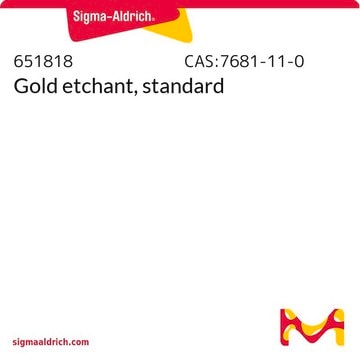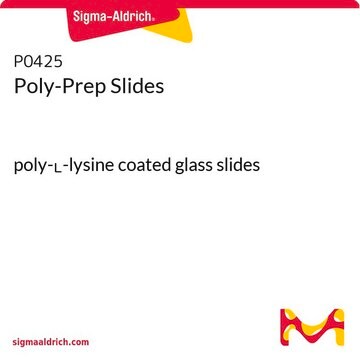643246
Gold coated glass slide
99.999% (Au), layer thickness 1000 Å
About This Item
Recommended Products
Quality Level
Assay
99.9% (Ti)
99.999% (Au)
L × W × thickness
3 in. × 1 in. × 0.7 mm
layer thickness
1000 Å
transmittance
380-700, >91% (for the glass microscope slide alone)
refractive index
n20/400 1.52 (lit.)
matrix attachment
Titanium, as adhesion layer used to bind the gold to the aluminosilicate glass cover slip
SMILES string
[Au]
InChI
1S/Au
InChI key
PCHJSUWPFVWCPO-UHFFFAOYSA-N
Looking for similar products? Visit Product Comparison Guide
Application
- Simple surface modification of poly(dimethylsiloxane) for DNA hybridization.: Highlights the application of gold-coated glass slides in creating effective biosensors for DNA hybridization, supporting innovations in genomics and pharmaceutical research (Zhou et al., 2010).
- Multimodal spectroscopy combining time-of-flight-secondary ion mass spectrometry, synchrotron-FT-IR, and synchrotron-UV microspectroscopies on the same tissue section.: Utilizes gold-coated glass slides to integrate multiple spectroscopic techniques, enhancing the analysis of complex biological samples, pivotal for cutting-edge research in biochemistry and material sciences (Petit et al., 2010).
Features and Benefits
Other Notes
Storage Class Code
11 - Combustible Solids
WGK
nwg
Flash Point(F)
Not applicable
Flash Point(C)
Not applicable
Choose from one of the most recent versions:
Already Own This Product?
Find documentation for the products that you have recently purchased in the Document Library.
Customers Also Viewed
Articles
Hybrid organic-inorganic sol-gel materials containing silica were first called “ORMOSILs” in 1984.
Protocols
SAMs are versatile surface coatings for chemical resistance, bio-compatibility, sensitization, and molecular recognition for sensors and nano fabrication.
SAMs are versatile surface coatings for chemical resistance, bio-compatibility, sensitization, and molecular recognition for sensors and nano fabrication.
SAMs are versatile surface coatings for chemical resistance, bio-compatibility, sensitization, and molecular recognition for sensors and nano fabrication.
SAMs are versatile surface coatings for chemical resistance, bio-compatibility, sensitization, and molecular recognition for sensors and nano fabrication.
Our team of scientists has experience in all areas of research including Life Science, Material Science, Chemical Synthesis, Chromatography, Analytical and many others.
Contact Technical Service







